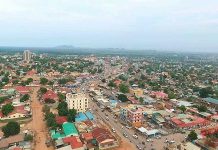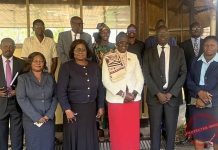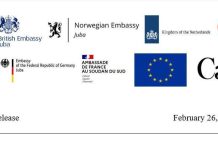Africa-Press – South-Sudan. The increasing population of refugees in Adjumani refugee settlements was greatly threatening the resource curved shape and affected the quality-of-service delivery to both the host communities and the refugee population.
District leaders claim that although new entrance of refugees had stopped, there were still many number of South Sudanese entering Uganda in search of social amenities and many in the settlements were producing at a high rate.
According to the data from the office of the Prime Minister, Adjumani was home to closely 236,000 refugees from South Sudan which was more than the national population that stood at 232,000, according to the 2014 Uganda Bureau of Statistics (UBOs) report. Ben Anyama, the District Chairman said in two years’ time, the population of the refugees may go up to 250,000 which he noted would affect the resources allocation for the district. Anyama noted that the continued conflict in South Sudan had kept many South Sudanese to send their children to Uganda to access education and health services. He said due to the conducive environment provided by the Ugandan government, many of the refugees found producing many children possible. The District Chairperson also said that the bulging population has had a far-reaching impact on social, economic, and political impacts.
“Our classrooms are filled to full capacity, our hospital is a 100-bed capacity but currently the hospital is
treating more than five hundred patients, the maternity ward alone has 25 bed capacity yet right now it has 100 mothers and this means that services have to be compromised”, Anyama stated. Although the population of the refugees has been increasing, district officials said when it came to service delivery, they did not marginalize the refugees and host communities and all were treated equally. The Adjumani district chief administrative officer Mr. Michael Wanje pointed out that the services to the
refugees were planned for by UNHCR and UN Agencies but now with the National development Plan III (NDP III), Uganda was by then tried to factor in the issues of humanitarian assistance to refugees with the open-door policy Uganda has. He noted that the open-door policy has led to the increase in population of the refugees which has a negative impact on the resources envelope of the district.
“The district for financial year
2021/2022 passed a budget of shs70billion for a population of 232,000 but now with an additional population of 236,000 refugees means another additional budget of 70billion is needed to be able to deliver effective services,”Wanje said.






